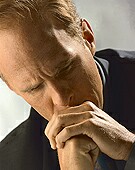
MONDAY, July 9 (HealthDay News) — When making quick decisions, people tend to prefer the option presented to them first, a new study shows.
Researchers from the Haas School of Business at the University of California, Berkeley, found that this idea applied to everything from choosing items on a menu to selecting a college to deciding which candidate to hire for a job. They argued that their findings could have many practical applications, including how products are marketed to consumers.
“The order of individuals performing on talent shows like American Idol, the order of potential companies recommended by a stockbroker, the order of college acceptance letters received by an applicantall of these firsts have privileged status,” study co-author Dana Carney, assistant professor of management, said in a university news release. “Our research shows that managers in management or marketing, for example, may want to develop their business strategies knowing that first encounters are preferable to their clients or consumers.”
In the first experiment, more than 120 participants were asked to evaluate three groups: two teams, two male salespeople and two female salespeople. Participants were introduced to the two teams one after the other. Immediately after they were introduced, the participants had to choose which group to join.
Participants were then told they were buying a car and were introduced to two salespeople, one after the other. When asked from which person they would rather buy the car, the participants always preferred the first person to whom they were introduced.
In testing their theory on preferences for consumer products, the researchers asked more than 200 passengers at a train station to choose quickly between two similar pieces of bubble gum. Once again, when forced to decide immediately, the participants mostly chose the gum that was presented to them first.
To test the “first is best” theory on more negative decisions, the researchers asked another 31 participants to view similar mug shots of two 29-year-old criminals known to have committed the same violent crimes. After seeing the photos, they were asked to decide who should get parole. Again, when “thinking fast,” the participants judged the first criminal presented as more worthy of parole.
The researchers explained that in situations where people must make decisions quickly, their preferences are unconsciously and immediately guided to the options they were given first. Although there are sometimes rational reasons for wanting what they see first, the study found firsts are preferred even without good reason, which may be an evolutionary adaptation.
The study was published online July 9 in the journal PLoS ONE.
More information
The U.S. National Institute of Neurological Disorders and Stroke provides more information on how the brain works.

